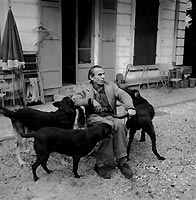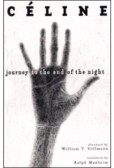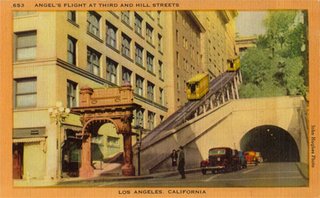

I somehow missed this essay on Louis-Ferdinand Céline by Will Self on the occasion of a new edition of Journey to the End of the Night, one of the darkest, most hilarious, bleakest, and most profound books I've ever read. You can randomly open the book to any page and find something remarkable. For example:
I'd pretty well come to the point, the age, you might say, when a man knows what he's losing with every hour that passes. But he hasn't yet built up the wisdom to pull up sharp on the road of time, and anyway, even if you did stop you wouldn't know what to do without the frenzy for going forward that has possessed you and won your admiration ever since you were young. Even now you're not as pleased with your youth as you used to be, but you don't dare admit in public that youth may be nothing more than a hurry to grow old.
In the whole of your absurd past you discover so much that's absurd, so much deceit and credulity, that it might be a good idea to stop being young this minute, to wait for youth to break away from you and pass you by, to watch it going away, receding in the distance, to see all its vanity, run your hand through the empty space it has left behind, take a last look at it, and then start moving, make sure your youth has really gone, and then calmly, all by yourself, cross to the other side of Time to see what people and things really look like.
From Self's essay:
What else is there in “Journey” to relieve the succession of taunts, jibes and foul-mouthed insults Céline flings against the world? A great deal. There are so many aphorisms — at least one per page — that the whole reads like La Rochefoucauld on LSD. (“Since we are nothing but packages of tepid, half-rotted viscera, we shall always have trouble with sentiment.”) Céline offers devastating critiques of Christianity, capitalism, socialism — all the kleptocratic belief systems devised to keep the poor in their place, and the bourgeoisie in theirs as well. But liberationists of all stripes — including William T. Vollmann, who supplies an afterword for the new edition in the style of le maître — are mistaken in claiming Céline as one of their own. Despite a critique of imperialism that reads like a scrambled “Heart of Darkness,” passages set in the United States that recall a crazed reworking of Kafka’s “Amerika,” and even the war sections, with their echoes of “The Good Soldier Schweik,” “Journey” is no political picaresque. Rather, the novel is a furious attempt to place one man’s consciousness at the epicenter of a world that is exploding under the centripetal influences of capitalism, imperialism, consumerism and licentiousness. In this, Céline anticipates the essentially apolitical rodomontades of the American Beats, quite as much as he belongs with the excruciating Marxian posturing of the interwar French existentialists and Surrealists.
 Paper Thin Walls previews a compilation of 47 women working in "experimental noise, field recordings, glitch rock, drone and other related genres." The post features an interview with Ninah Pixie, curator of Women Take Back the Noise and creator of the "noise cookie" custom-made, circuit-bent packaging.
Paper Thin Walls previews a compilation of 47 women working in "experimental noise, field recordings, glitch rock, drone and other related genres." The post features an interview with Ninah Pixie, curator of Women Take Back the Noise and creator of the "noise cookie" custom-made, circuit-bent packaging.


























